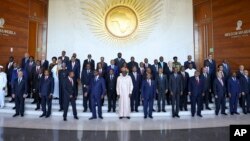The A.U. brokered AfCTA agreement was signed in Rwanda by 44 African nations in 2018 to strengthen inter-continental trade. Since then, 54 African nations, excluding Eritrea, have become signatories, expanding the pact's reach.
Achaleke Christian Leke, the A.U.’s youth ambassador for peace to Central Africa, told VOA the AfCFTA will help Africa capitalize on its raw materials, innovative products and market to Africans.
"Even in countries where they are advanced (in Africa), other African countries cannot benefit and I think that’s why this glorious idea of the Africa free trade zone is so important and timely," Leke said.
The Secretariat of the AfCFTA estimates that a $3.4 trillion free trade bloc can be achieved among Africa's population of 1.3 billion people.
The AfCFTA says the trade agreement has the potential of lifting 30 million people out of extreme poverty while raising income levels to $450 billion by 2035.
The International Monetary Fund has urged African countries to implement the free trade area agreement, saying it will provide a major boost to Africa's economic output and help tackle challenges like climate change.
But several experts argue the AfCFTA may be set for failure if African leaders do not immediately address underlying challenges on the continent such as rampant corruption and poor infrastructure. Leke agrees, but cautions the agreement needs implementation.
"The AfCFTA is coming at a time when we have already identified these issues and rather than complain about their existence, let us figure out how to use this institution and existing structures to collaborate in a way which one speaks to another," Leke said.
Financial bodies note that the intra-continental trade could grow by 53% if steps are taken to remove trade barriers.
The IMF says the largest factors weighing on intra-African trade are infrastructures such as trans-border road, rail, port and air transport networks, along with border and customs procedures, telecommunications, financial development, human capital, the presence and efficacy of institutions, and restrictive product and labor regulations.
Tanatsiwa Dambuza, an advocate of the AfCFTA and the co-founder of Zimbabwe Institute of African Integration, said corruption and poor infrastructure has a huge impact on African Small to Medium Enterprises (SMEs).
"We talk of corruption at the borders, the Small to Medium Enterprises, the young people and women also suffer because officers sometimes ask for bribes," Dambuza said.
Entrepreneurs and the AfCFTA
Dambuza called on African leaders to collaborate to ensure the AfCFTA lives up to its potential, to allow for easy market access for African entrepreneurs to sell their products at reasonable prices.
A recent World Bank report identified small-and-medium enterprises [SMEs] as playing a major role in sustaining the economies of developing countries, contributing up to 40% of national income (GDP) in emerging economies.
Ojooluwa Ibiloye, the founder of RuralPro Nigeria, a Nigerian non-governmental organization [NGO] focused on promoting democracy in Africa, echoed Dambuza.
"Political will is very important and key for governments to see the opportunity in this agreement,” Ibiloye said.
Global trade trends show that it is cheaper and faster for African nations to trade outside of Africa than it is within its borders, an issue the AfCFTA expects to address.
In 2022, Kenyan authorities celebrated an export deal of batteries and tea produced by the East African nation to Ghana, but noted eight weeks delivery from Nairobi to Accra, a timeframe exacerbated by infrastructure and connectivity issues.
Aside from the challenges presented by analysts and officials, Gugulethu Siso, the founder of Thumeza, an African tech startup focused on providing credit to young entrepreneurs, said it is important that SMEs in Africa embrace and understand the AfCFTA.
"Imagine you as youth in South Africa sitting and thinking that it’s not going to impact you - but in two years time someone like Jumia [a Kenyan online store] can operate in your market with a free-for-all. How exactly do you protect your market share?" Siso questioned.
She is challenging SME's to financially and logistically prepare for the potential changes the agreement can bring to Africa as continental trade borders begin to open.









Forum